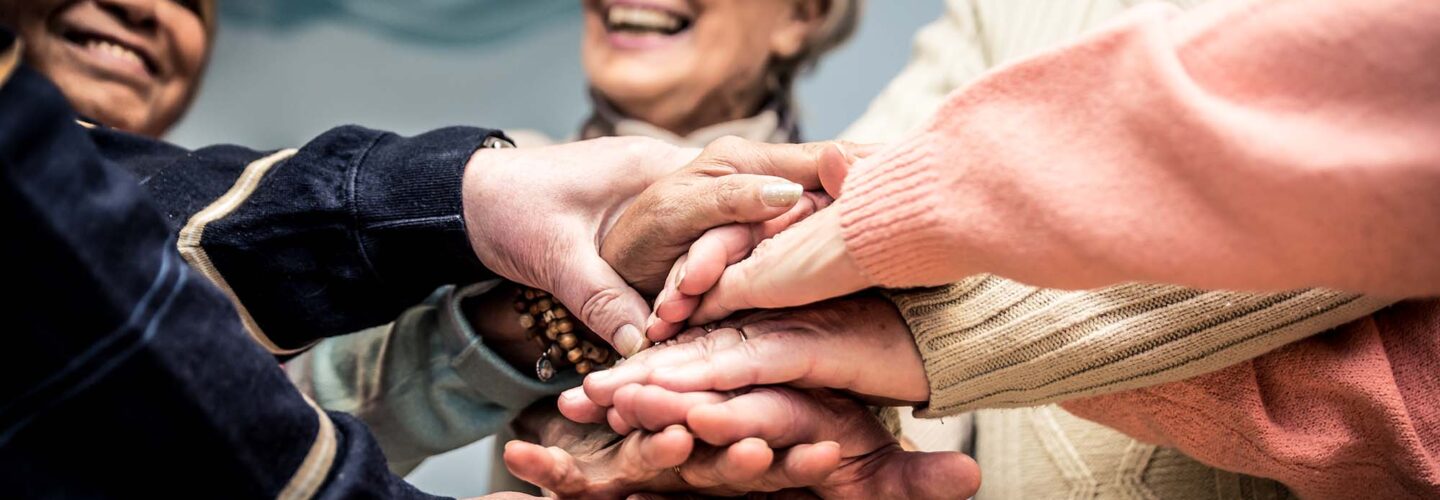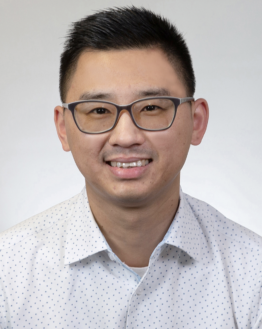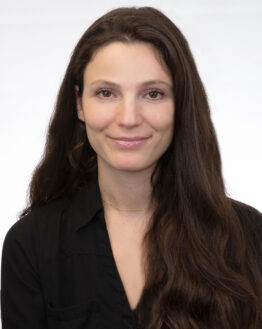Maimonides—supporting you and your family
Patients and families coping with a cancer diagnosis and treatment can face tremendous stress. Distress from cancer frequently impacts a person at many points along their journey starting from diagnosis and continuing through treatment, as well as into the time of survivorship post-treatment.
At Maimonides Cancer Center, our team of expert cancer specialists works collectively to help patients and families as they cope with challenges caused by cancer. We help provide information to promote cancer awareness and prevention, treatment options, clinical trials, and new developments. We also help you navigate issues such as practical concerns and management of symptoms, and connect you and your loved ones to a variety of resources, such as support groups and wellness programs.
Psychiatry
Patients can be referred for specialty assessment and management of the psychological, emotional, cognitive, and behavioral problems that arise in association with cancer. A psychiatrist is available with expertise in treating psychiatric problems in patients with cancer. Evaluation and follow up for medication management is available to address symptoms including depression, anxiety, sleep disturbance, concentration, and memory problems.
Psychology
Referrals are available to the psychologist for individual, family, and couples counseling. The psychologist can assist patients of all ages in coping with a variety of stressors related to their diagnosis and treatment. Treatment may include cognitive behavioral therapy, and supportive and insight-oriented therapy tailored to the individual needs of the patient.
Social Work
Oncology social workers help empower patients and families through all phases of the cancer journey. They help patients access information to understand their diagnosis and treatments as well as offer support in coping with the disease and the many emotions that may arise with a cancer diagnosis.
- Practical Issues
- Accessing affordable medical care
- Connecting to legal services for the on-site attorney (NYLAG)
- Finding medical supplies and medical equipment
- Getting post-mastectomy bras and prostheses, wigs, lymphedema sleeves
- Assisting applications to programs offering financial and practical assistance
- Referrals for home care and hospice care
- Finding available transportation assistance
- Providing information on government entitlements, social security benefits, disability benefits, and insurance coverage
- Emotional and Educational Support
- Providing psychoeducation and supportive counseling related to adjustment after diagnosis
- Facilitating effective communication with treatment team members
- Long-term planning with use of advanced directives
- Accessing support groups and wellness programs
- Caregiver support
Nutrition
Nutrition is an integral part of comprehensive cancer care. The Maimonides Cancer Center offers a nutrition program that provides patients with proper guidance on how to appropriately nourish their bodies before, during and after treatment. The program works toward this goal by providing early nutrition intervention and identifying problems that affect the success of anticancer therapy. Finding and treating nutrition problems early can help patients gain or maintain weight, sustain energy and strength, lessen side effects from treatment, improve the response to cancer therapy and reduce complications of treatment.
One-on-One Nutrition Counseling
Approximately 65 to 70 percent of oncology patients suffer from malnutrition which can hinder a patient’s ability to heal and recover from cancer in significant ways. Our oncology team refers patients who are at risk for poor nutrition to a registered dietitian who provides private nutrition counseling, tailored to meet the treatment needs of each patient.
Nutrition counseling can provide oncology patients with information to:
- Aid in post-treatment recovery
- Aid in weight control
- Clarify confusing health claims
- Maintain strength and energy
- Manage the interactions between certain foods and certain drugs
- Prevent or treat malnutrition which can cause weakness, and decrease resistance to infections
- Promote food safety for patients with decreased immunity
- Reduce the side effects of treatment which can interfere with eating
Nutrition Education
Since good nutrition shouldn’t end when treatment does, our dietitian also provides counseling tailored to the needs of cancer survivors. A healthy diet and lifestyle are key factors in optimizing our health. Our dietitian provides guidance on food quality, balance of nutrients, healthy relationship with food, and good eating habits that assist patients with cancer prevention and healthy survivorship.
Seasonal recipes are available in all public areas for patients to take home to try and enjoy with their loved ones.
Palliative Care
Patients can be referred to a palliative care specialist for the management of symptoms associated with cancer and cancer treatment.
Our Supportive Care team works closely with patients and families at every stage of the cancer journey, and partners with the Maimonides Cancer Center supportive services team, including physicians, nurse practitioners, clinical nurse specialists, social workers, psychiatrists, psychologists, and registered dietitians. We collaborate proactively with your primary care team and focus on improving quality of life by managing symptoms such as nausea, pain, shortness of breath, fatigue, and depression.
Hospice is an integrated, specialized palliative care program, specifically for patients who are approaching the end of their life. Most hospice care is provided to the patient in their own home and is focused on helping patients live fully and with the best quality of life during this time.
Additional Services
Prevention and Screening Programs
Each year, the Maimonides Cancer Committee offers cancer screening programs for various types of cancer. These programs are designed to find cancer in its early stages in people who are at high risk for the disease, based on genetics, family history, and/or the environment.
Genetic Counseling
Every person should undergo regular cancer screening, but for individuals with a higher risk of developing cancer, the Genetic Counseling program at Maimonides Cancer Center provides Brooklyn’s diverse population with an added measure of prevention.
Cancer Research and Clinical Trials
By participating in clinical trials, patients get first access to potentially lifesaving treatments—which can be combined with other therapies or as a valuable option in first-line therapy failure—and advance new knowledge that will help future generations.
Support and Wellness Programs
The center has a variety of Support and Wellness programs available to our patients. Programming includes some of the following types of activities for our patients:
- Quarterly Lecture Series: Each quarter we have a different lecture on a topic relevant for cancer patients. Previous topics have included: Disability, Sexuality and Intimacy after Cancer, Nutrition and Mindfulness
- Support and Stress Management Group (Wednesdays 11AM-12PM): Weekly in-person support group that includes stress reduction exercises.
- Yoga: Monthly in-person yoga class specifically designed for cancer patients taught by oncology certified yoga instructor. Registration is required.
- Meditation: Monthly in-person meditation group where patients can learn helpful tips to reduce anxiety & boost energy. Registration is required.
- Art Classes: In-person art class alternating each month between pediatric patients and adult patients. Registration is required.
To RSVP for any of our classes below, please call Joanne Situ 718-765-2682 or Sharyn Luo 718-765-2655 for more information.
April Calendar 2025
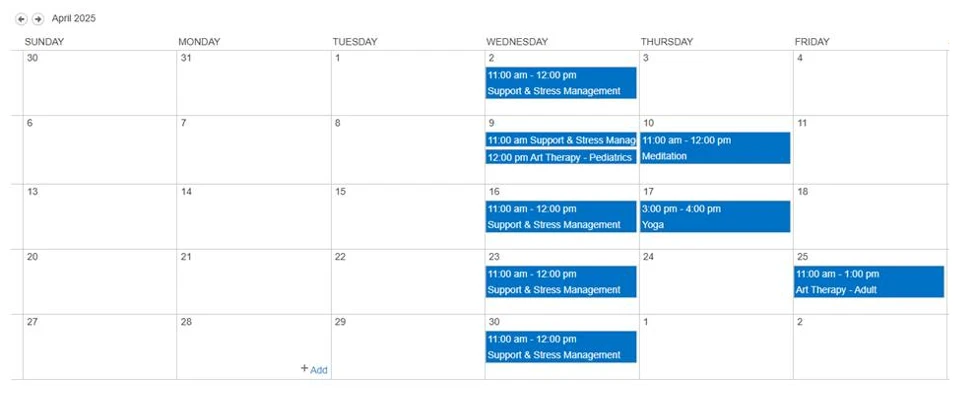
May Calendar 2025

June Calendar 2025
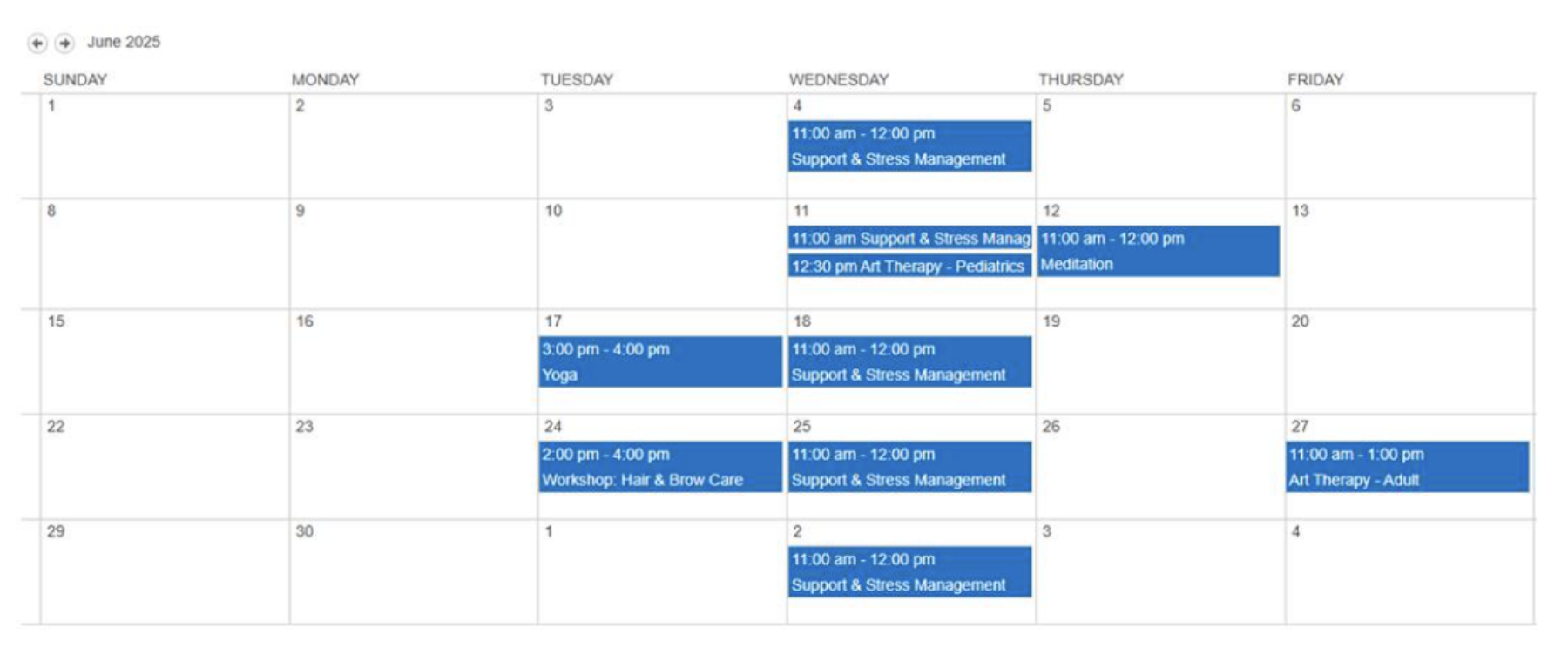
July Calendar 2025

August Calendar 2025


